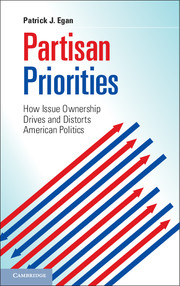2 - Consensus Issues
Amid Polarization, Shared Goals
Published online by Cambridge University Press: 05 August 2013
Summary
This chapter sets the stage for the rest of the book by demarcating the set of issues for which the concept of issue ownership is analytically relevant. These “consensus issues” have to do with shared goals on which surveys consistently show broad consensuses exist among Americans – liberals and conservatives alike – for spending and government action. Because of the universal popularity of these goals, neither party can afford to be explicitly against achieving them. Rather, the parties are differentiated in three ways: they disagree about which consensus goals should be priorities, they disagree about how well those in government have performed in pursuit of those goals, and they disagree about which policies are best suited to achieving the goals.
The remainder of the chapter discusses theoretical and empirical criteria for determining whether an issue qualifies as a consensus issue. It introduces the ceteris paribus criterion – the idea that, all things being equal, Americans must support government action and spending on a consensus goal in order for the debates associated with it to be considered a consensus issue. It then delves more deeply into the distinction between priorities and policies, and shows how common it is for voters to find a party’s prioritization of a consensus issue to be appealing while being opposed to key policy stances the party takes on the issue. The chapter then shows that Americans’ expressed support for multiple national priorities does not take into account the obvious trade-offs of time and resources that make it impossible for the government to pursue them all simultaneously. Thus, the Democratic and Republican parties lose very few votes because of their ownership of particular consensus issues. Because this is not true for the positions the parties take on non-consensus issues such as abortion, gay rights, or gun rights, the analytical relevance of the concept of issue ownership is largely limited to understanding the politics of consensus issues.
Information
- Type
- Chapter
- Information
- Partisan PrioritiesHow Issue Ownership Drives and Distorts American Politics, pp. 16 - 48Publisher: Cambridge University PressPrint publication year: 2013
